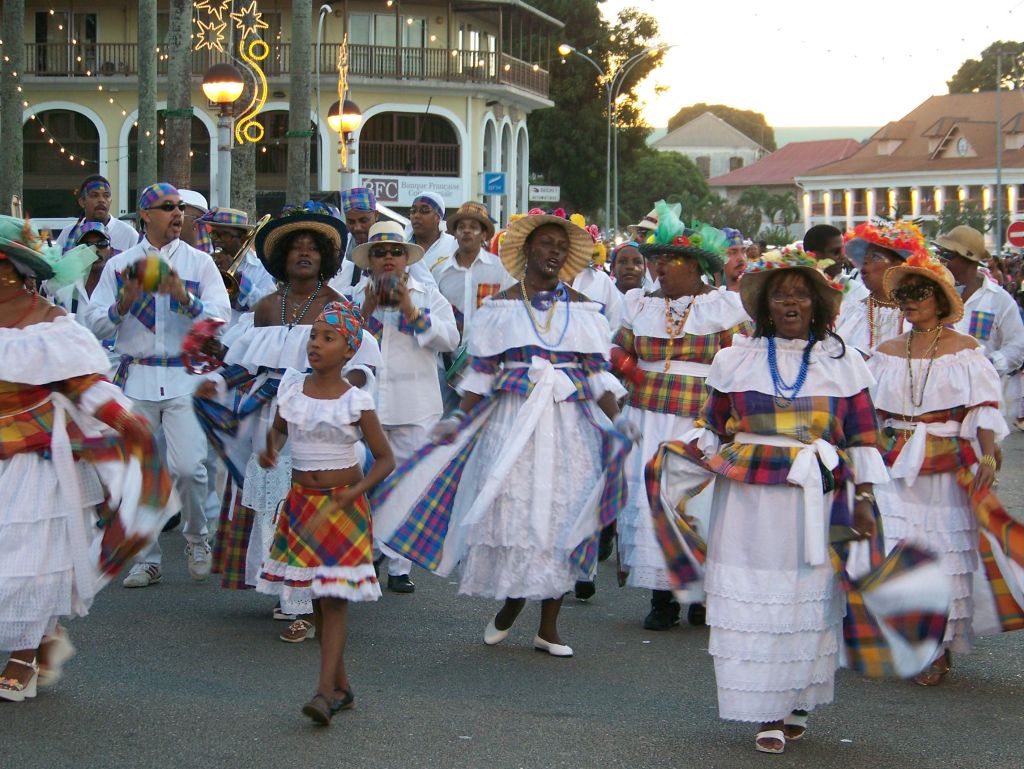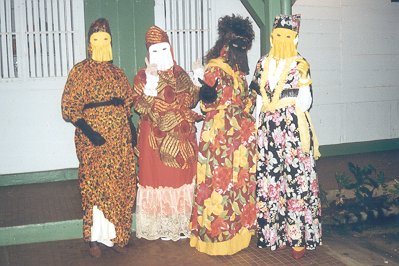Carnival in French Guiana on:
[Wikipedia]
[Google]
[Amazon]
 Carnival in
Carnival in 
 Carnival Queen and most famous character is the Touloulou, an elegantly dressed lady who wears a petticoat, hood,
Carnival Queen and most famous character is the Touloulou, an elegantly dressed lady who wears a petticoat, hood,
 Neg'Marrons are groups of men dressed in ''kalimbé'' (red
Neg'Marrons are groups of men dressed in ''kalimbé'' (red
 On the Saturday preceding Lent, the Touloulous, carnival Queens, dress in colourful, camouflaged dresses and wear masks while they dance through the streets. Their costumes – lace and petticoats, tights and gloves – cover them from head to toe. They speak in disguised voices to retain anonymity. The women invite the men to join them, which is a mandatory requirement. On Friday and Saturday nights, the Toulouois assemble in large dance halls. Men who are invited have to pay an entry fee.
On the Saturday preceding Lent, the Touloulous, carnival Queens, dress in colourful, camouflaged dresses and wear masks while they dance through the streets. Their costumes – lace and petticoats, tights and gloves – cover them from head to toe. They speak in disguised voices to retain anonymity. The women invite the men to join them, which is a mandatory requirement. On Friday and Saturday nights, the Toulouois assemble in large dance halls. Men who are invited have to pay an entry fee.
Grande Parade de Kourou - Guyane.JPG, Touloulous parade during the Grande Parade de Kourou
Carnaval à Kourou Danseuse en bleu.jpg, Dancer, Kourou
Carnaval à Kourou Danseurs en orange.jpg, Dancers, Kourou
Kourou carnaval dragon chinois 2007.jpg, Carnival dragon by the Chinese community
 Carnival in
Carnival in French Guiana
French Guiana ( or ; french: link=no, Guyane ; gcr, label=French Guianese Creole, Lagwiyann ) is an overseas department/region and single territorial collectivity of France on the northern Atlantic coast of South America in the Guianas. ...
is a major event. Its style is described as Afro-Caribbean. A moveable holiday, it takes place between Epiphany
Epiphany may refer to:
* Epiphany (feeling), an experience of sudden and striking insight
Religion
* Epiphany (holiday), a Christian holiday celebrating the revelation of God the Son as a human being in Jesus Christ
** Epiphany season, or Epiph ...
and Ash Wednesday, ending on Mardi Gras. Known internationally for its Paré-masqué balls and its emblematic character, the Touloulou, it is considered the longest carnival in the world.
The participants – French, Creole, Brazilian and Chinese people – dress in vibrant costumes. Main events include a parade and a burlesque-style marriage.

Background
This celebration is a cultural tradition of the Guianan Creole, its origin traced to carnival customs practiced in Europe. It debuted during the beginning of colonization, between the 1600 and 1700 centuries. When settlers took part in carnival, forbidding the slaves from participating. Defying the ban, the slaves practiced carnival in clandestine ways, seeing it as a way to regain some freedom, to commemorate African fertility, and to deride the settlers. In the present day, metropolitan, Brazilian and Chinese communities take part in the event. Its occurrence varies, prescribed by the religious calendar and taking place between the Epiphany in early January, and Ash Wednesday, which marks the beginning ofLent
Lent ( la, Quadragesima, 'Fortieth') is a solemn religious observance in the liturgical calendar commemorating the 40 days Jesus spent fasting in the desert and enduring temptation by Satan, according to the Gospels of Matthew, Mark and Luke ...
. Carnival ends on Shrovetide
Shrovetide, also known as the Pre-Lenten Season or Forelent, is the Christian period of preparation before the beginning of the liturgical season of Lent.
Shrovetide starts on Septuagesima Sunday, includes Sexagesima Sunday, Quinquagesima S ...
.
Traditional costumes
There are several traditional costumes in the French Guiana carnival, representing various figures.King Vaval
King Vaval is a mythical figure who serves as carnival king. He is introduced at the beginning of the festival and dies on Ash Wednesday, to be reborn like the Phoenix in the following year.Touloulou
 Carnival Queen and most famous character is the Touloulou, an elegantly dressed lady who wears a petticoat, hood,
Carnival Queen and most famous character is the Touloulou, an elegantly dressed lady who wears a petticoat, hood, Domino mask
Dominoes is a family of tile-based games played with gaming pieces, commonly known as dominoes. Each domino is a rectangular tile, usually with a line dividing its face into two square ''ends''. Each end is marked with a number of spots (also ca ...
, and long gloves
Ladies' evening gloves or opera gloves are a type of formal glove that reaches beyond the elbow.
Ladies' gloves for formal and semi-formal wear come in three lengths for women: wrist, elbow, and opera or full-length (over the elbow, usually r ...
, so that none of her skin is visible. The aim of the woman who masquerades as a ''touloulou'' is to not be recognized. She strolls down the street and participates in the masked balls. The character represents the bourgeois women of 18th and 19th centuries.
Nèg Maron
 Neg'Marrons are groups of men dressed in ''kalimbé'' (red
Neg'Marrons are groups of men dressed in ''kalimbé'' (red loincloth
A loincloth is a one-piece garment, either wrapped around itself or kept in place by a belt. It covers the genitals and, at least partially, the buttocks. Loincloths which are held up by belts or strings are specifically known as breechcloth or ...
) and coated with molasses. Representing fugitive slaves, they seek to make order of the festival.
Other traditional costumes
Other traditional characters include the ''Zombi baréyé'', azombie
A zombie ( Haitian French: , ht, zonbi) is a mythological undead corporeal revenant created through the reanimation of a corpse. Zombies are most commonly found in horror and fantasy genre works. The term comes from Haitian folklore, in w ...
character; ''Jwé farin'', who is dressed in white trousers, shirt, pointed hat, and mask, representing a baker; ''Bobi'', is dressed in old potato sacks and appears as a bear led by a leash; ''Karolin'', representing a rich woman with gold who is jealous and protects other women; ''Lanmò'', who represents death, is dressed in white; '' Soussouris'', who represents the bat, is a winged character who commonly wears black or two tones, and is renowned for its vampire behavior; and ''Diab rouj'' (red devil), who dresses in red and black. The ''tululu'' (mask) is worn in French Guiana while celebrating carnival.
Events
Paré-masked ball
 On the Saturday preceding Lent, the Touloulous, carnival Queens, dress in colourful, camouflaged dresses and wear masks while they dance through the streets. Their costumes – lace and petticoats, tights and gloves – cover them from head to toe. They speak in disguised voices to retain anonymity. The women invite the men to join them, which is a mandatory requirement. On Friday and Saturday nights, the Toulouois assemble in large dance halls. Men who are invited have to pay an entry fee.
On the Saturday preceding Lent, the Touloulous, carnival Queens, dress in colourful, camouflaged dresses and wear masks while they dance through the streets. Their costumes – lace and petticoats, tights and gloves – cover them from head to toe. They speak in disguised voices to retain anonymity. The women invite the men to join them, which is a mandatory requirement. On Friday and Saturday nights, the Toulouois assemble in large dance halls. Men who are invited have to pay an entry fee.
Street parades
Sunday is the day of parades. It require months of preparation. They occur on the streets of Cayenne,Kourou
Kourou () is a commune in French Guiana, an overseas region and department of France in South America. Kourou is famous for being the location of the Guiana Space Centre, the main spaceport of France and the European Space Agency (ESA). It i ...
, and Saint-Laurent-du-Maroni
Saint-Laurent-du-Maroni (; gcr, Senloran di Maronni) is a commune of French Guiana, an overseas region and department of France located in South America. Saint-Laurent-du-Maroni is one of the three sub-prefectures of French Guiana and the seat ...
. Groups dress according to the theme of the year. The parade includes decorated floats and there are musicians playing drums and brass. Thousands of spectators line the sidewalks and sit in the stands which are set up for the occasion. Brazilian groups have similar costumes to those encountered at Rio Carnival, while the country's Asian community incorporates dragons in the festivities. On Monday, a sham act of marriage with women (brides) in men's gowns and men (grooms) in women's dresses is the main spectacle. Tuesday, the last day of the festival, is marked by the appearance of the main spirit of King Vaval, who is considered by the locals to be "the devil and soul of carnival". He arrives on a canoe in the form of an effigy, made of straw. A very large number of people gather on the beach to welcome him. On this occasion the dancers are dressed in black or red coloured costumes adorned with horns and tails and holding pitchforks. The effigy is then burnt in the night and on the following day, Ash Wednesday, people wear black and white dresses to mourn the passing of Vival.
Food and drink
Fridays commonly include eating a cake, known as the ''galette des rois
A king cake, also known as a three kings cake, is a cake associated in many countries with Epiphany. Its form and ingredients are variable, but in most cases a () such as a figurine, often said to represent the Christ Child, is hidden inside. ...
'' (cake of kings, which in mainland France would be eaten only for the Epiphany
Epiphany may refer to:
* Epiphany (feeling), an experience of sudden and striking insight
Religion
* Epiphany (holiday), a Christian holiday celebrating the revelation of God the Son as a human being in Jesus Christ
** Epiphany season, or Epiph ...
), representing the Three Kings
The biblical Magi from Middle Persian ''moɣ''(''mard'') from Old Persian ''magu-'' 'Zoroastrian clergyman' ( or ; singular: ), also referred to as the (Three) Wise Men or (Three) Kings, also the Three Magi were distinguished foreigners in the ...
. This cake has a Creole version, much more popular than the French one. Blaff(fish or chicken broth) and Punch
Punch commonly refers to:
* Punch (combat), a strike made using the hand closed into a fist
* Punch (drink), a wide assortment of drinks, non-alcoholic or alcoholic, generally containing fruit or fruit juice
Punch may also refer to:
Places
* Pun ...
is also commonly consumed during this period.
Gallery
References
Bibliography
* * * * * * * *External links
* {{Carnival around the world French Guianan culture Entertainment events in French Guiana Festivals in French Guiana Carnivals in French Guiana February events Religion in French Guiana